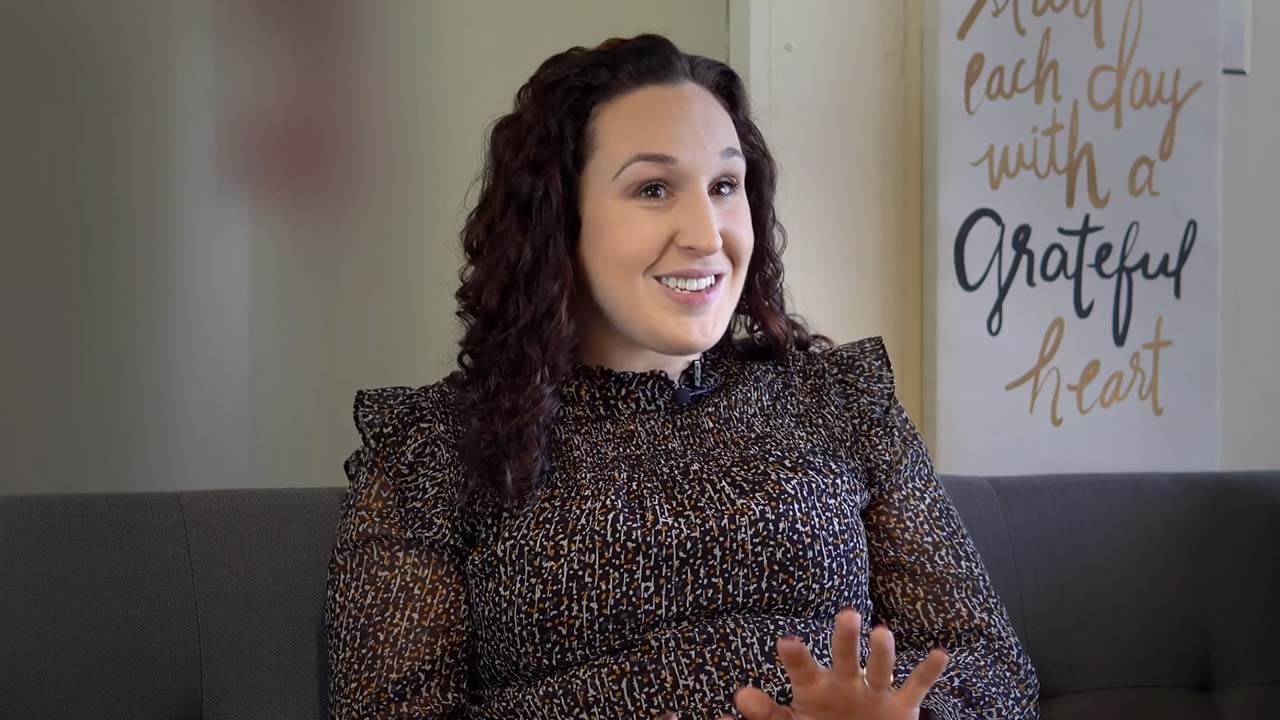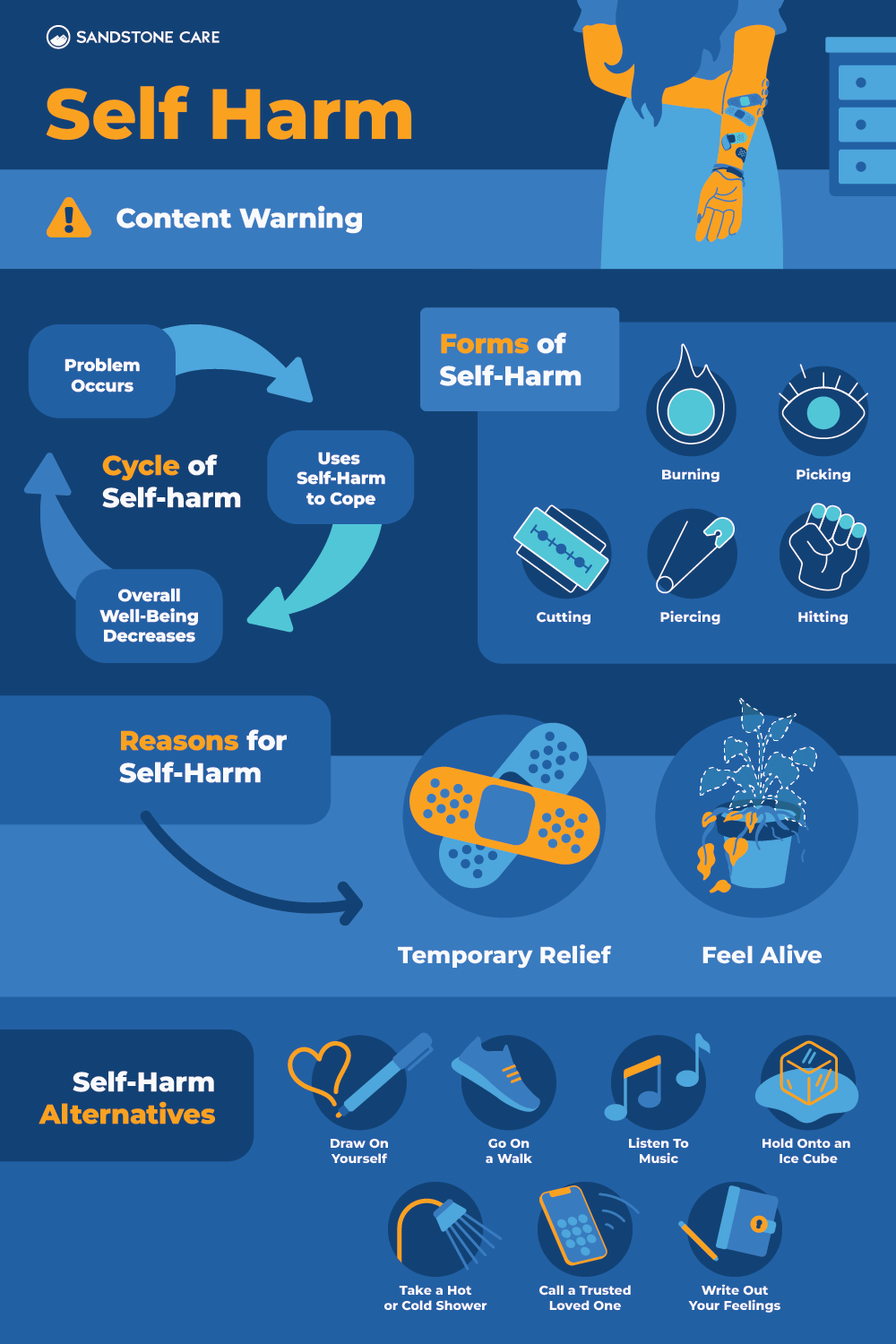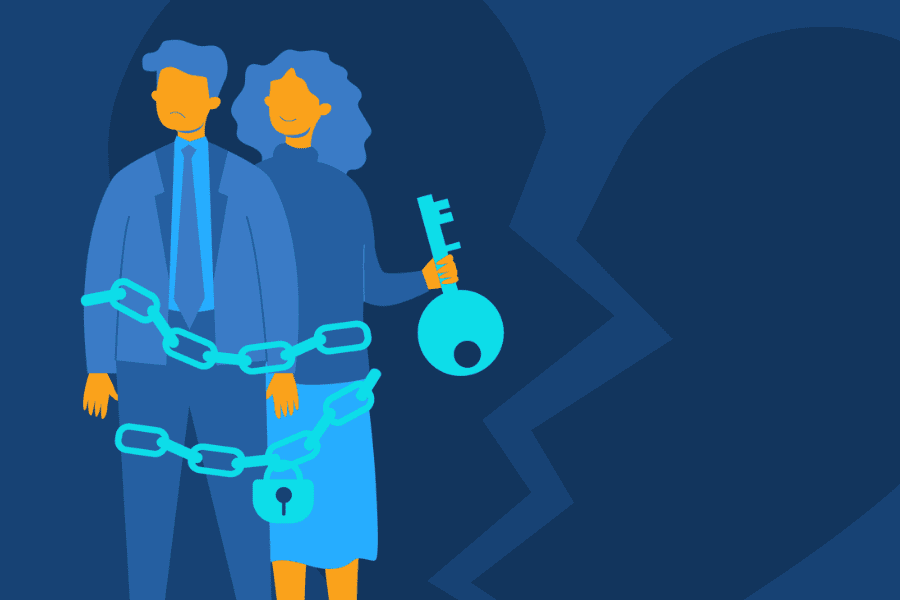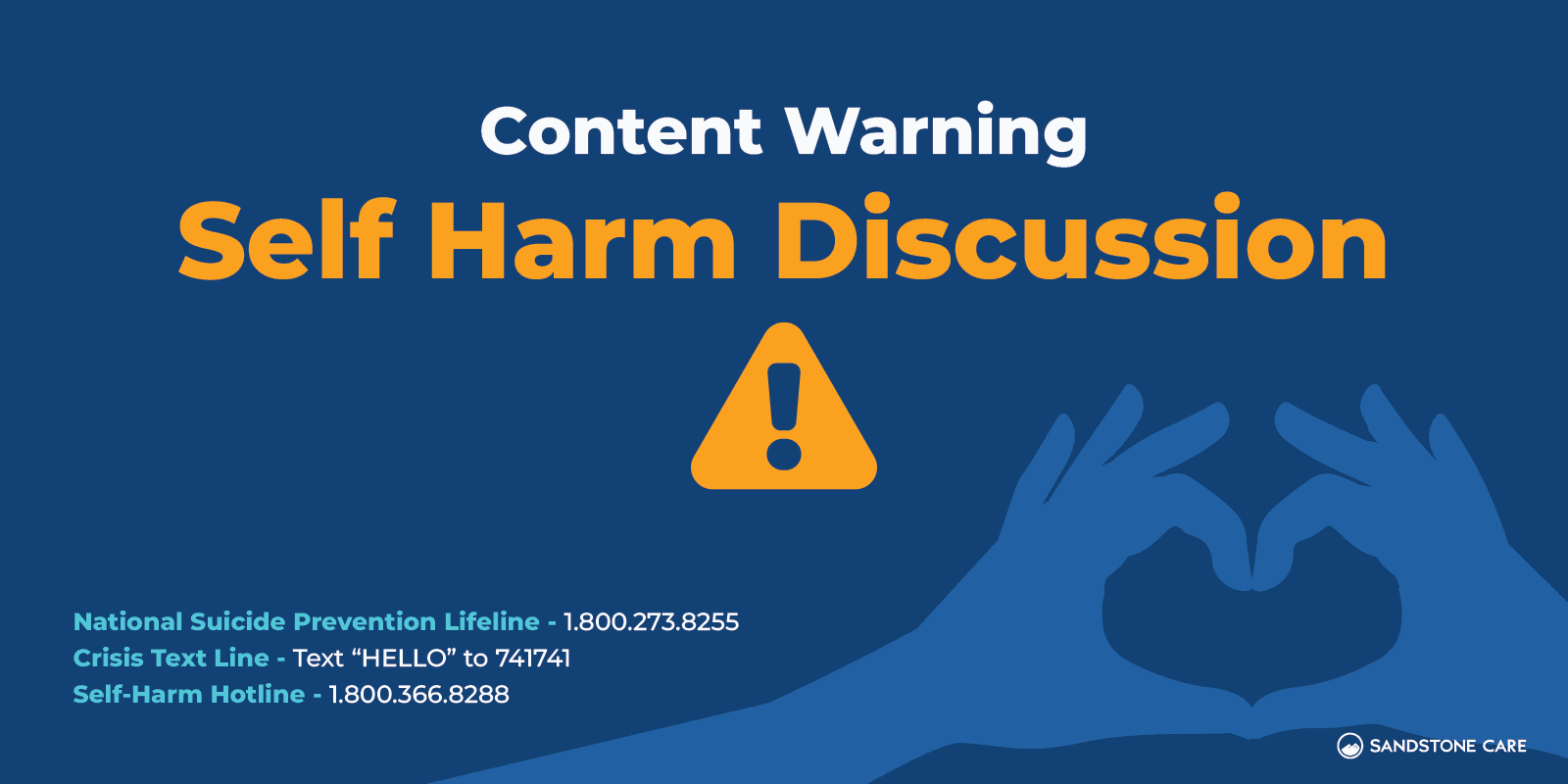
Self Harm
Trigger Warning: Self-Harm Discussion
This blog post discusses self-harm, including different types of self-injury and coping mechanisms. While the intention is to provide understanding and support, the content might be triggering for some individuals. If you or someone you know is struggling with self-harm, please consider reaching out to a mental health professional or a helpline. Here are some resources that can provide immediate help:
National Suicide Prevention Lifeline
Crisis Text Line: Text “HELLO” to 741741
What Is Self-Harm?
Self-harm is when a person purposely hurts their own body. Sometimes it is referred to as self-directed violence or self-injury, it is a serious problem affecting people of all ages, from children to teens and adults.
Some injuries may be minor, others may be severe, but either can seriously harm a person’s health and increase the risk of suicide.
What Counts as Self-Harm?
Self-harm is when someone intentionally hurts or injures their body, and it can take many different forms. Some people may cut themselves, pierce their skin with objects, hit themselves, burn themselves, or bruise themselves.
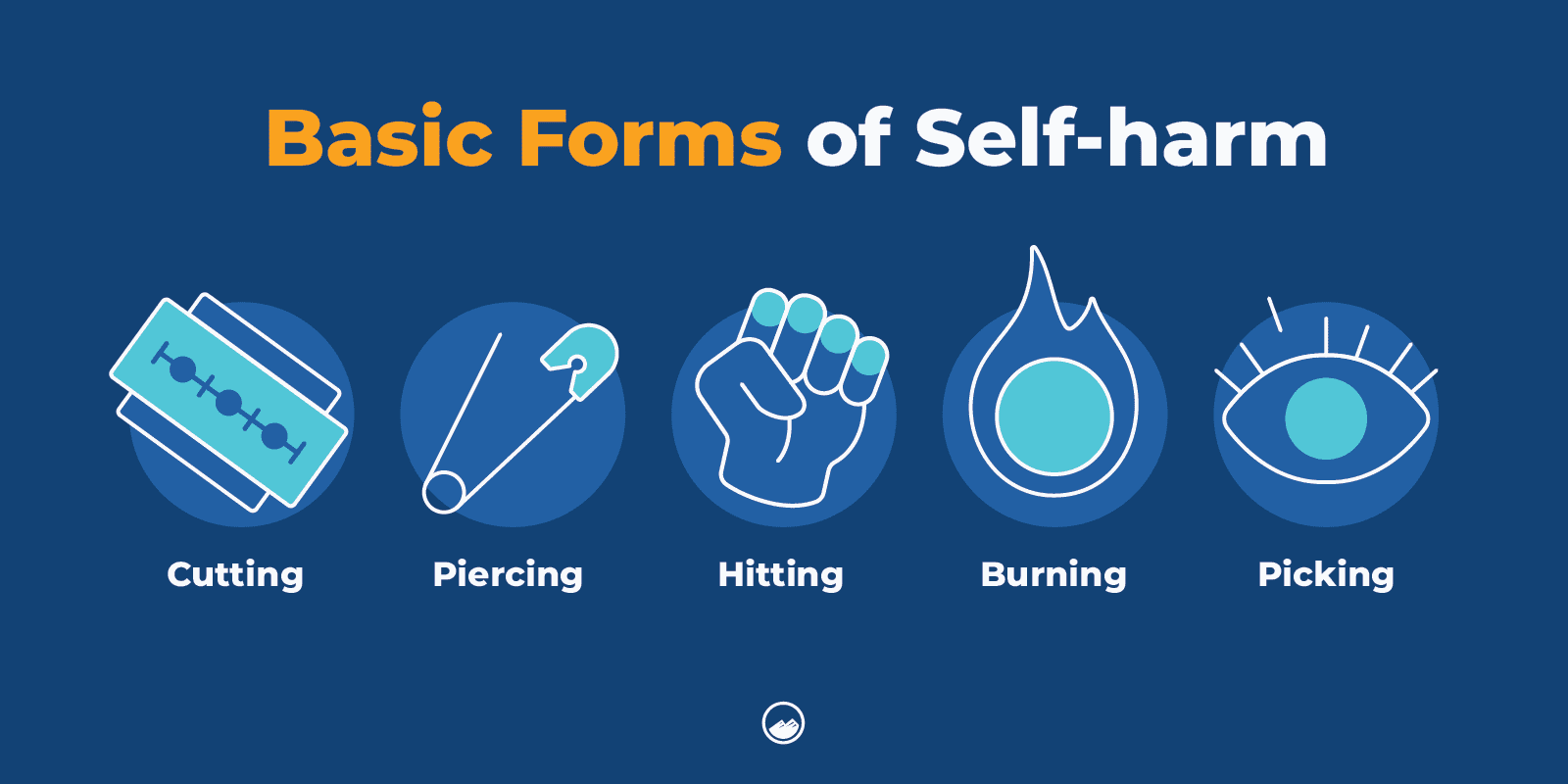
How Common Is Self-Harm?
Self-harm can affect individuals from many groups, particularly adolescents. Additionally, it is reported that girls have higher rates of non-suicidal self-injury behaviors than boys, according to the Official Journal Of The American Academy of Pediatrics.
Why Is Self Harm Bad?
Self-harm not only impacts your physical health and well-being but your mental health, too. It also puts individuals at risk of serious harm and, in some cases, can be life-threatening.
Self-harm is often an unhealthy problem-solving coping mechanism for difficult feelings or experiences. Engaging in self-harming behaviors can lead to a dangerous cycle that only worsens the problem, even if it offers temporary relief.
Self-harm is dangerous and can lead to various health problems and mental disorders.
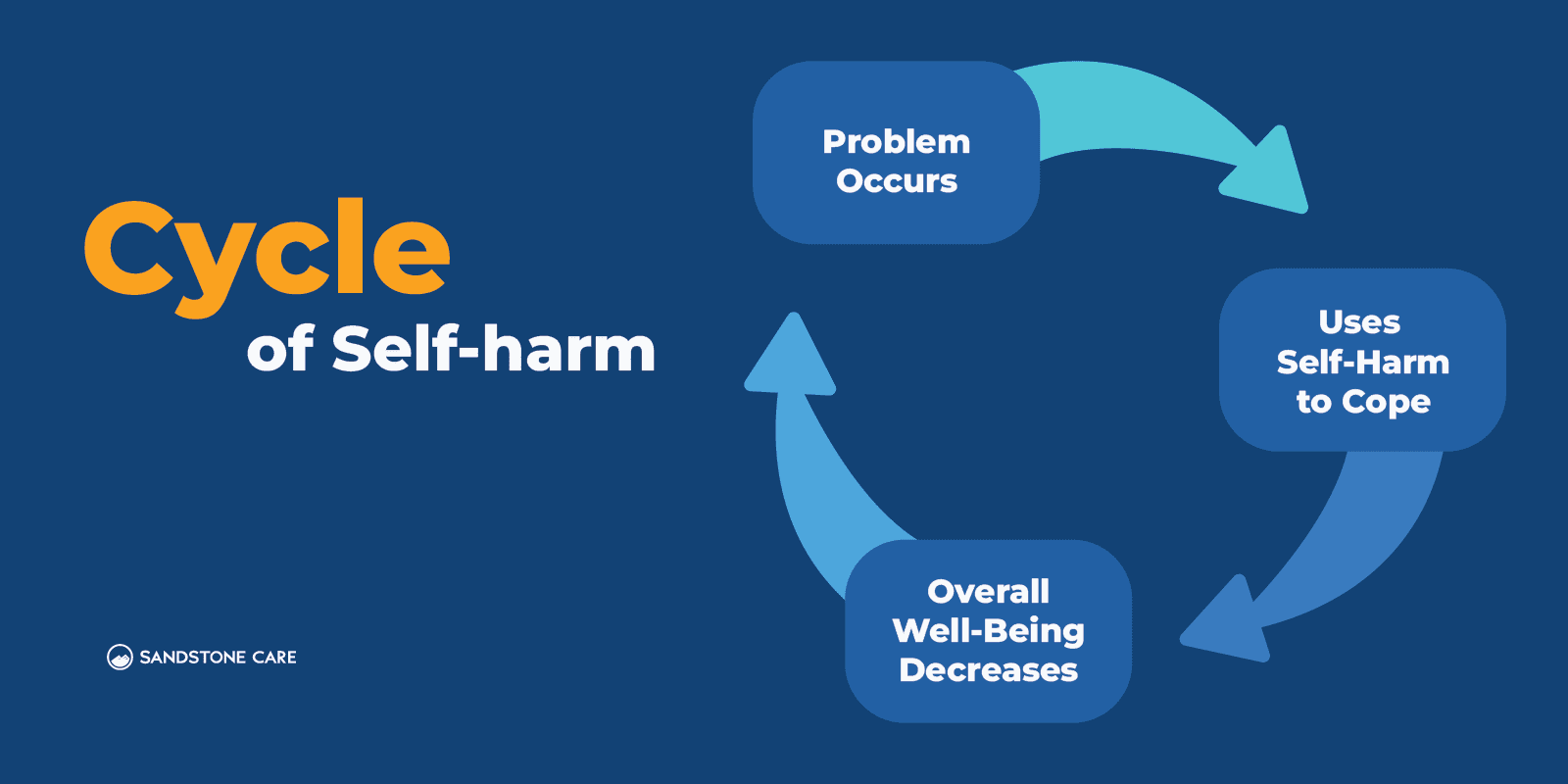
Is Self Harm a Mental Illness?
Self-harm is not a mental illness but a behavior that serves as an unhealthy coping mechanism for difficult feelings. However, a person sometimes self-injures because of a mental health disorder or another underlying problem.
Types of Self-Harm
What Are Forms of Self Harm?
Self-harm can take many different forms. These can include:
- Cutting the skin
- Scratching
- Biting
- Burning their skin
- Punching themselves
- Piercing the skin with sharp objects
- Picking at the skin
- Pulling out the hair
- Overdosing on substances or alcohol
- Over-exercising to the point of injury
- Headbanging
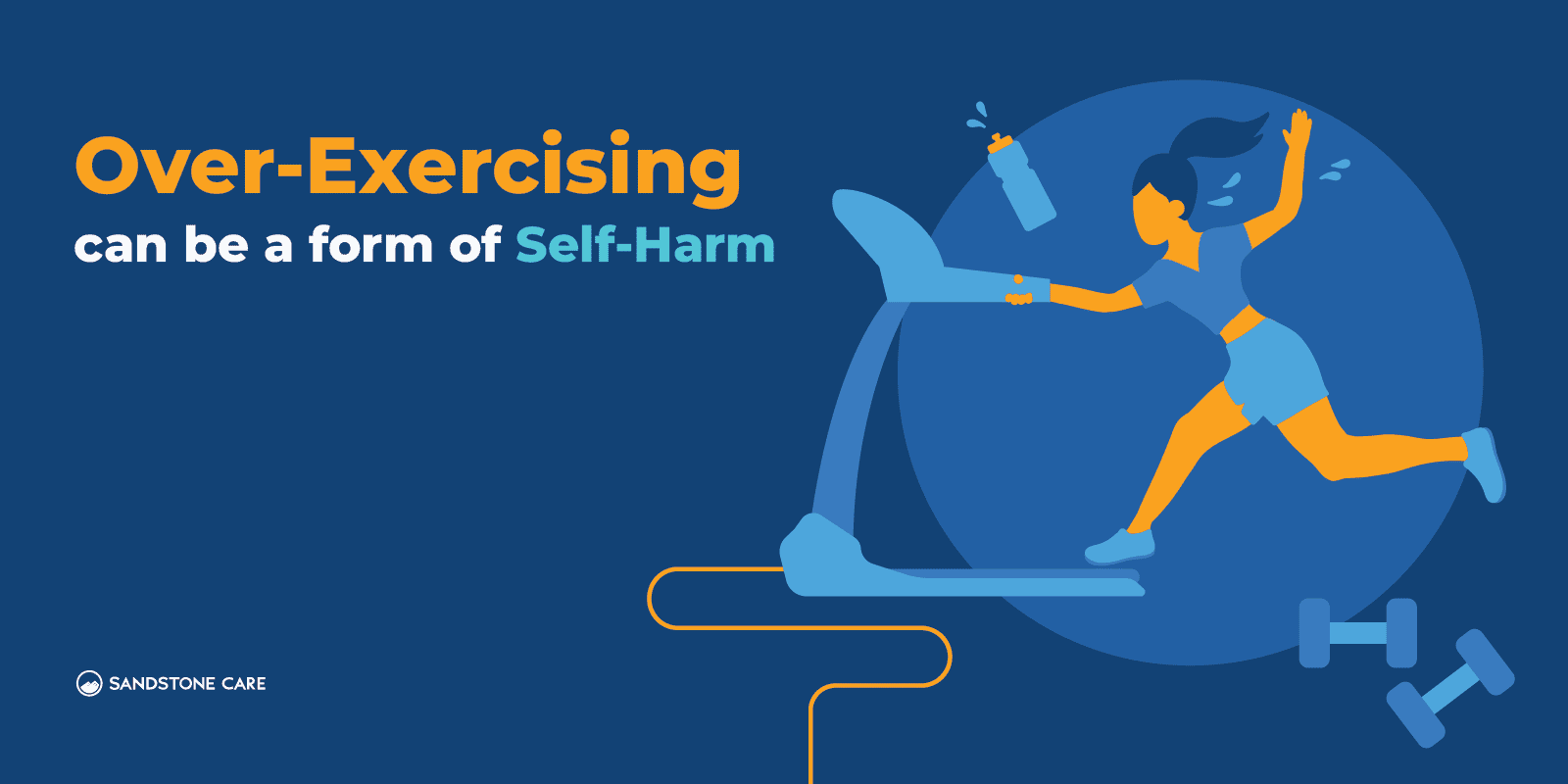
How Do People Self Harm?
People self-harm in many different ways. They may hit themselves, burn themselves, scratch, pierce their skin, or even use substances to self-harm.
Is Skin Picking Self Harm?
Repetitive skin picking is a self-injurious behavior that can cause serious harm.
Self-injurious skin picking is considered a serious and chronic psychiatric and dermatologic problem. Skin picking can also be associated with OCD, which involves self-harming behaviors to manage and regulate emotions.
Is Hitting Yourself Self Harm?
Hitting yourself, or even hitting something else that causes you pain, is considered self-harm.
Is Biting the Inside of Your Cheek Self Harm?
Cheek-biting is considered a body-focused repetitive behavior that can also be a self-harming behavior. Cheek biting can also indicate underlying mental health issues like obsessive-compulsive disorder (OCD).
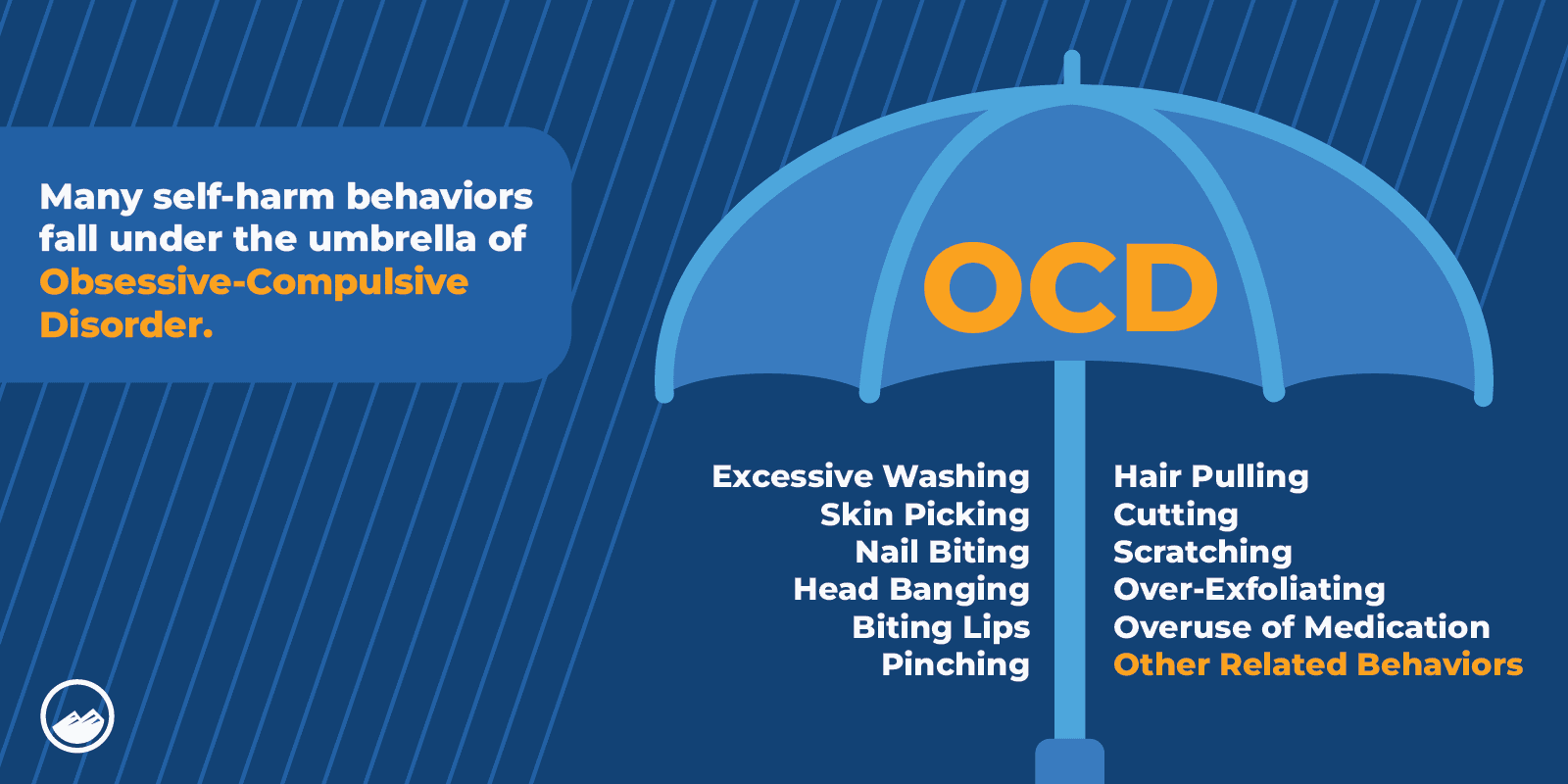
Is Starving Yourself Self Harm?
Sometimes, people think self-harm only involves the more obvious acts, such as cutting or hitting oneself. But starving yourself and even binge eating can be a form of self-harm.
According to Suicide and Life-Threatening Behavior, individuals with eating disorders are also at higher risk of self-mutilation, and vice versa.
Where on the Body Do People Self-Harm?
Individuals may self-harm anywhere on their body. However, the most common areas people self-harm include the hands, wrist, stomach, and thighs, often because it is easier to hide in those places.
Warning Signs of Self-Harm
What Does Self-Harm Look Like?
Self-harm can look different from person to person. Many people who self-harm may try to hide it in hopes that others won’t find out.
Common warning signs of self-harm can include:
- Wearing long sleeves or pants, even when it is hot
- Mentioning feelings of worthlessness or helplessness
- Frequently having fresh cuts, bruises, marks, or burns
- Possessing sharp objects
- Frequent experiences of accidental injuries
- Being unpredictable
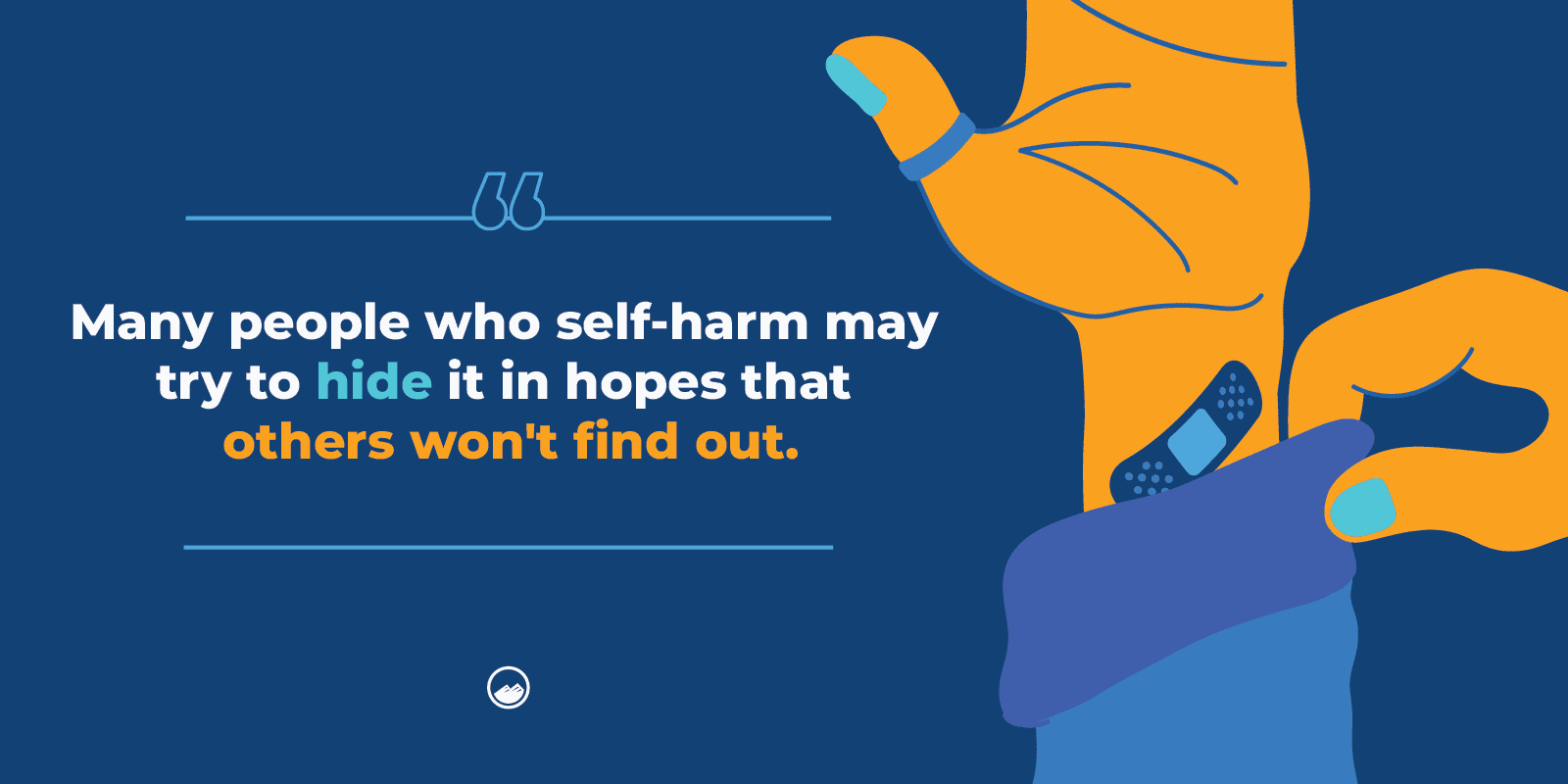
What Does Self-Harming Look Like in Teenagers?
Teens may self-harm for a variety of different reasons, whether it is to release or cope with pain, stress, anxiety, or other underlying mental health problems.
Teenagers often try to hide their self-harm, and this can also lead them to isolate and seclude themselves, even from trusted adults that they love.
This can also cause them to avoid situations where they may have to show certain parts of their skin, like changing in a locker room or swimming. They may also spend a lot of time alone, whether in the bathroom or locked in their room.
What Does Self-Harm in Adults Look Like?
It is often not obvious to loved ones that an adult is self-harming because they go through a lot to hide them. Adults who self-harm may also isolate themselves or lose interest in things they used to love.
They may also frequently have unexplainable injuries or marks or excuse them as accidents. Self-harming in adults can also have a significant impact on their daily lives, like at work or home. It can be hard to focus, concentrate, or control impulses.
What Are Self-Harm Scars?
When a person self-harms, it can leave marks and scars that may last for a long time.
Scars may happen in places where a person cuts, burns, or engages in other self-harm behaviors.
Causes for Self-Harm
What Are the Causes of Self Harm?
People self-harm for many different reasons. Some of the causes of self-harm can include:
- Low self-esteem
- Family or relationship conflicts
- Bullying
- Financial worries
- Stress
- Anxiety or depression
- Grief
- History of abuse or trauma
- Underlying mental health conditions
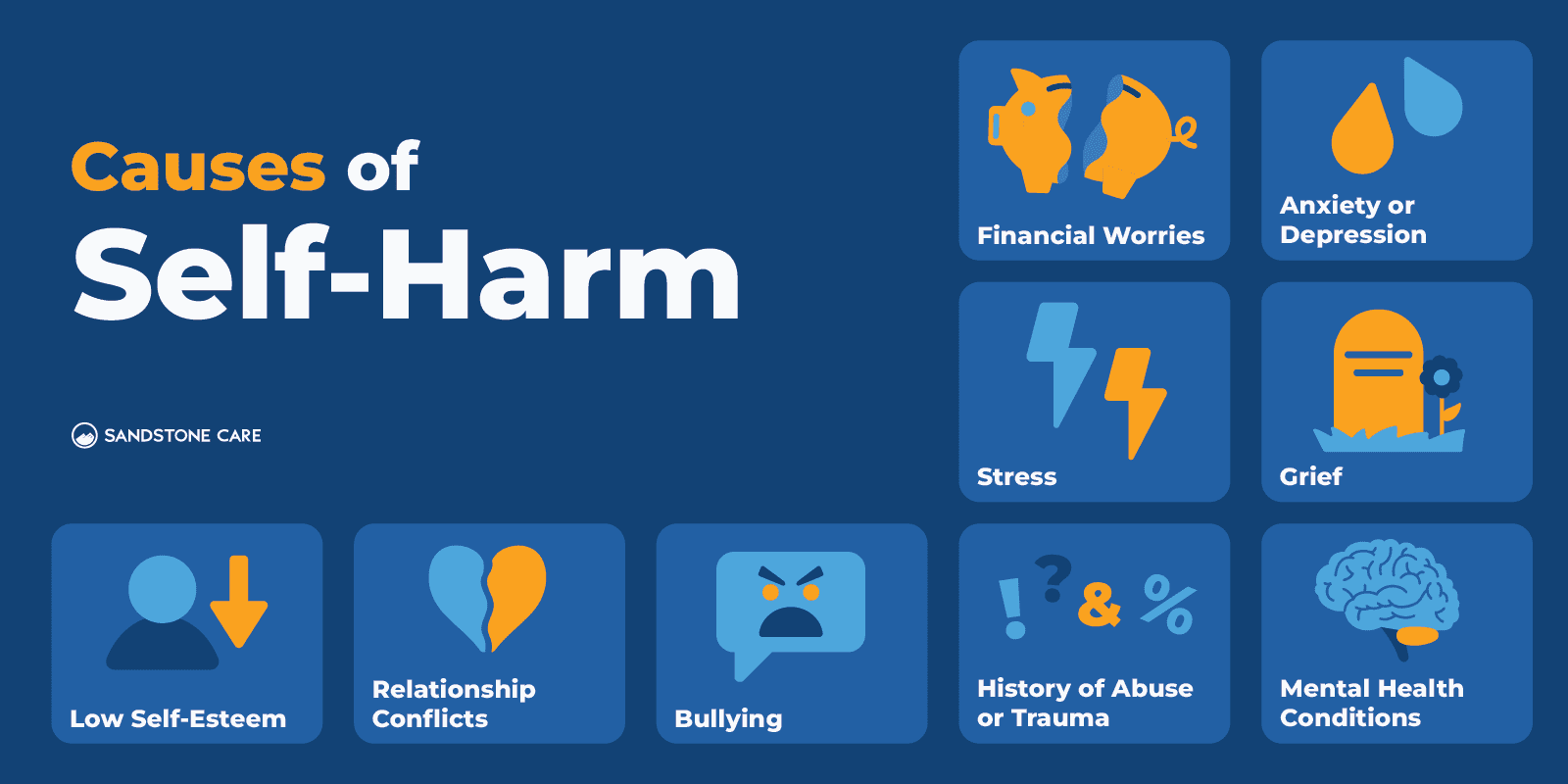
What Are the Risk Factors of Self Harm?
Children, teens, and adults may self-harm, but it most often starts in the teen or early adult years. Individuals who are more at risk for self-harm can include those who:
- Experienced childhood trauma or abuse
- Have mental health disorders such as depression, eating disorders, post-traumatic stress disorder (PTSD), or personality disorders
- Engage in drug or alcohol abuse
- Have low self-esteem or low self-worth
- Have friends or family members who self-harm
- Passive suicidal ideation that progressively becomes more severe
What Mental Health Conditions Lead to Self Harm?
Some mental health conditions that can put a person at higher risk for self-harm include depression, bipolar disorder, eating disorders, anxiety disorders, borderline personality disorder, schizophrenia, and substance abuse
Why Do Teenagers Self Harm?
The teenage years can be very difficult, with many new changes, transitions, and challenges.
Teenagers often feel pressure to look a certain way, to feel accepted by others, and to do well in school or extracurricular activities. These stressors, among many others, including the prevalence of mental health disorders in teens and young adults, can cause difficult and negative feelings that can be hard to cope with.
Teenagers may turn to self-harm as an unhealthy coping mechanism for difficult situations they are trying to find relief or escape from. Some teenagers may be dealing with bullying at school, problems in their family, or struggling with their body image and may turn to self-harm as an unhealthy way to cope with the pain.
Why Do I Self-Harm?
People may hurt themselves for many different reasons. Some people may find temporary relief or escape; others may self-harm to feel something, to feel alive.
People may self-harm because of how they see themselves or because they have gone through traumatic experiences or abuse. Some people may self-harm because they are going through challenging emotions and don’t know how to cope or ask for help. Self harm can sometimes release endorphins that provide small amounts of relief from emotional harm.
If you are self-harming, it is important for you to reach out for help. Talk to someone you trust, whether a parent, counselor, teacher, aunt, uncle or any other person you feel comfortable confiding in. It is essential to know that you are not alone and that there is help for you.
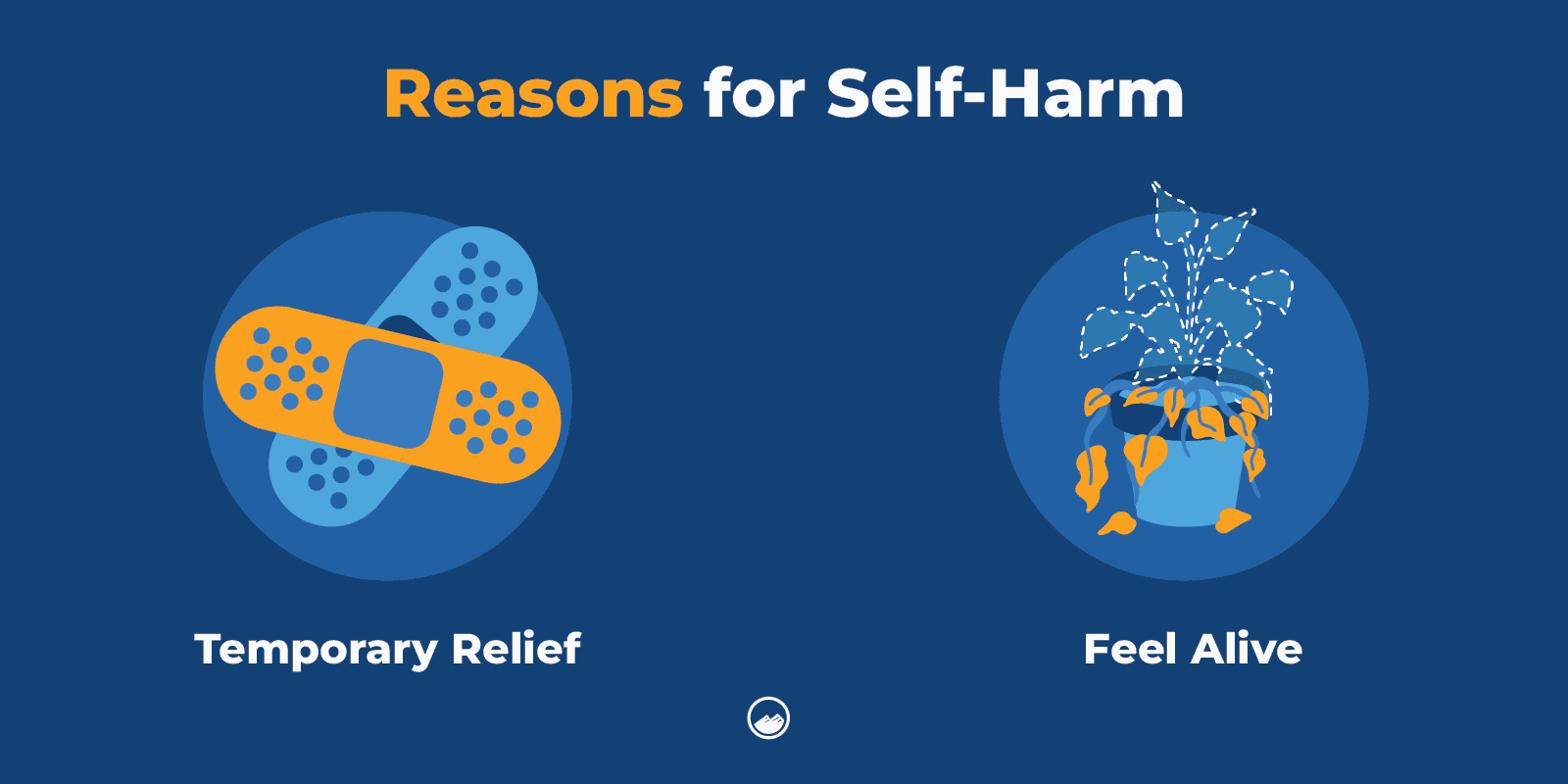
Side Effects of Self-Harm
Do Self-Harm Scars Go Away?
If a person has self-harmed, whether in the past or recently, there may be scars that last for a long time.
Everyone heals in different ways, some faster than others. It also depends on various factors, including how severe the harm was and other things like medical conditions or medications a person is taking.
Some scars may go away, while others may stay for a long time. But there are some important things to remember. One, your scars do not define you. Two, you have nothing to be ashamed of. Three, scars mean you are going through healing.
What Are the Short-Term Effects of Self Harm?
Some of the short-term effects of self-harm can include:
- Bleeding
- Physical pain
- Worsened feelings of shame and guilt
- Low self-esteem and self-worth
- Broken bones
- Injury to tendons, nerves, muscles, or blood vessels
What Are the Long-Term Effects of Self-Harm?
Some of the long-term effects of self-harm can include:
- Scarring
- Infected wounds
- Anemia
- Permanent tissue damage
- Intrusive thoughts about self-harming behaviors
- Broken bones
- Long-lasting or permanent numbness or weakness
- Organ failure
- Suicidal ideation
- Accidental suicide
If you are experiencing suicidal thoughts, know that you are not alone. Call the National Suicide Prevention Helpline at 988 to talk to someone and get help, or call 911.
Addiction to Self-Harm
Is Self-Harm Addictive?
Self-harm is not recognized as an addiction but can carry addictive qualities.
For example, many people who self-harm use these behaviors to cope with or manage extreme stress or difficult emotions. Self-harming may temporarily relieve a person’s distress, which can contribute to its addictive qualities.
Can Self-Harm Kill You?
Self-harming can be very dangerous and can come with long-term effects. Engaging in self-harming behaviors can also increase a person’s risk of serious physical injury and even, in some cases, accidental suicide.
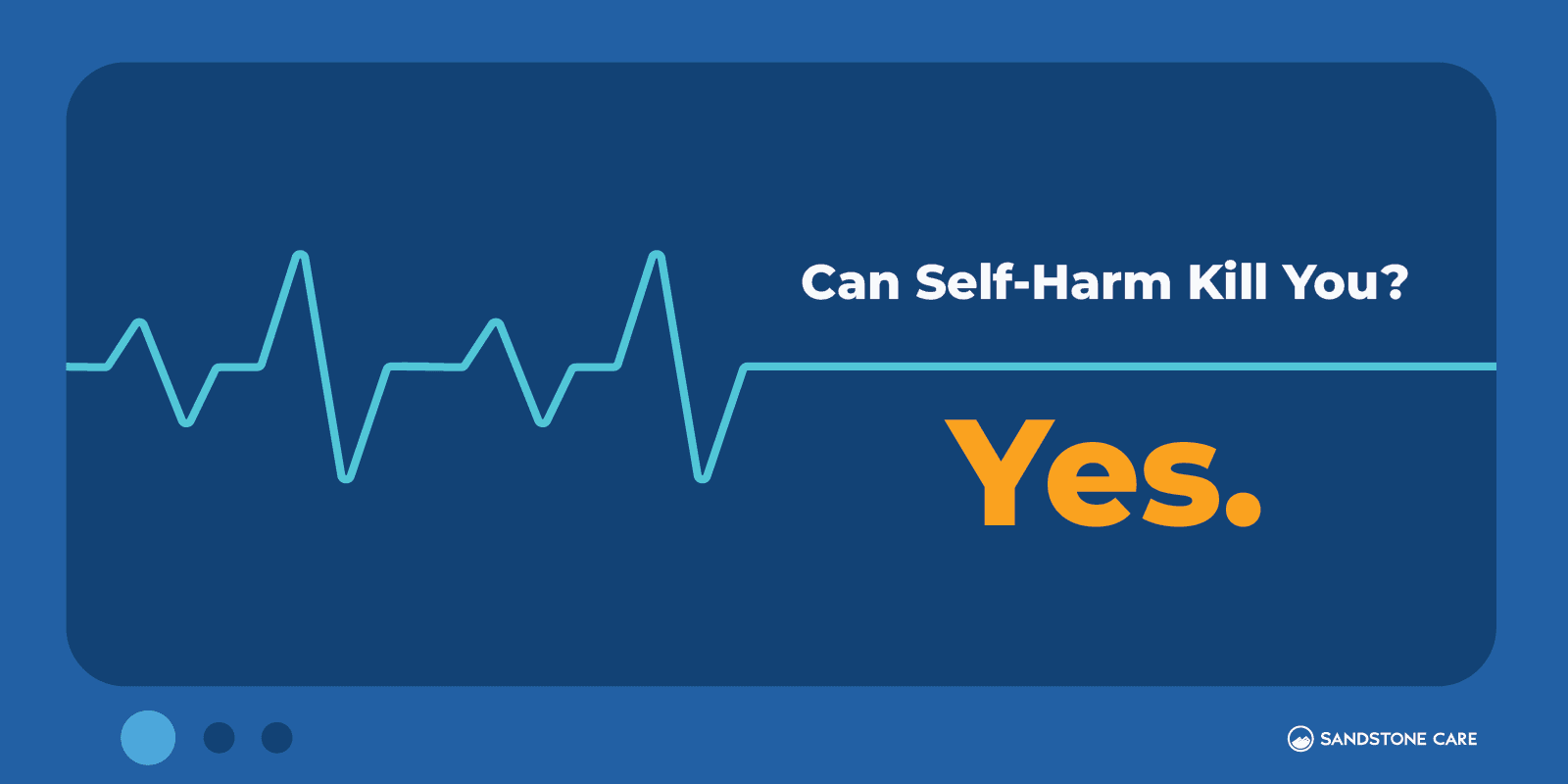
Is Self Harm Normal?
If you are self-harming, knowing that it is not something you should be ashamed of is important. Knowing that your feelings are valid is important, but self-harm is a dangerous way to cope.
Reaching out for help can help you find support and healing from whatever you are going through.
How to Help Someone Who Self-Harms
What Do You Say to Someone Who Self Harms?
It can be hard to know what to do or say if you find out someone close to you self-harms.
Some important things to remember when talking to a loved one about self-harm are to be supportive, non-judgmental, and calm. If they do not feel comfortable sharing certain things with you, don’t force them to. Instead, let them know you are there to support them and ready to talk whenever they are.
If you think someone is self-harming and you want to start a conversation with them, you can ask simple things like, “How have you been doing? Is there anything you want to talk about?”, “I’m here if you want to talk,” or “I’ve noticed you’ve been acting different lately. Is everything okay?”.
Talking about a topic like self-harm out of the blue can take somebody by surprise and be overwhelming. What is important is that a person feels safe and comfortable having a conversation on their time.
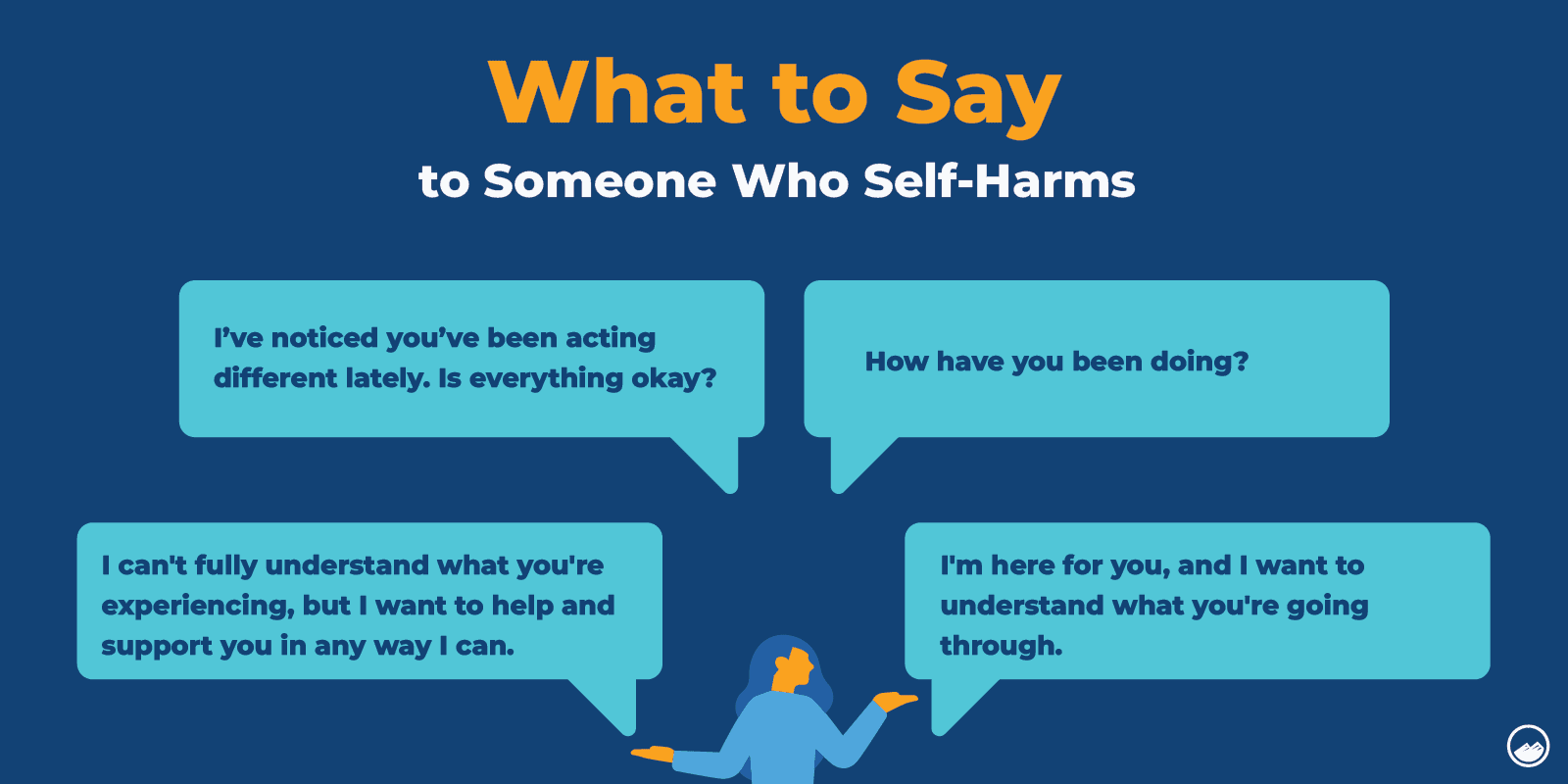
How Do I Stop Someone Who Self Harms?
If you are trying to help someone who self-harms, it is essential to be there for them, listen to them, and offer a safe space to come when they need to talk.
Helping them connect to a mental health professional is a huge part of stopping the cycle of self-harm.
How to Prevent Self-Harm?
Taking care of yourself and practicing healthy habits and coping strategies can help prevent self-harm.
Finding ways to distract yourself, whether going outside or on walks, getting physical exercise, calling friends, journaling, or other things you enjoy, can help prevent you from feeling the urge to self-harm.

Take the Quiz
See if you or a loved one needs support
Developed by Chief Clinical Officer Sarah Fletcher LPC
Alternatives to Self-Harm
What Can I Do Instead of Self-Harm?
Self-harm is often used to cope with emotional pain, difficult feelings, and experiences. Learning alternative ways to cope with these feelings can help a person work through these moments without falling into harmful and unhealthy habits.
The first step is recognizing when you are experiencing difficult emotions or when you feel the urge to self-harm. Instead of self-harming, you can turn to other coping mechanisms, such as going outside, getting physical exercise, talking to someone, meditating and breathing exercises, or journaling and using other creative outlets as a new lifeline.
What to Do When You Want to Self Harm?
Some people find it helpful to distract themselves when they get the urge to self-harm; others also find alternatives to use. These may include:
- Drawing on themselves
- Going on a walk
- Turning on music
- Holding an ice cube on your skin where you would self-harm
- Take a hot or cold shower
- Call someone you love and trust
- Write out your feelings
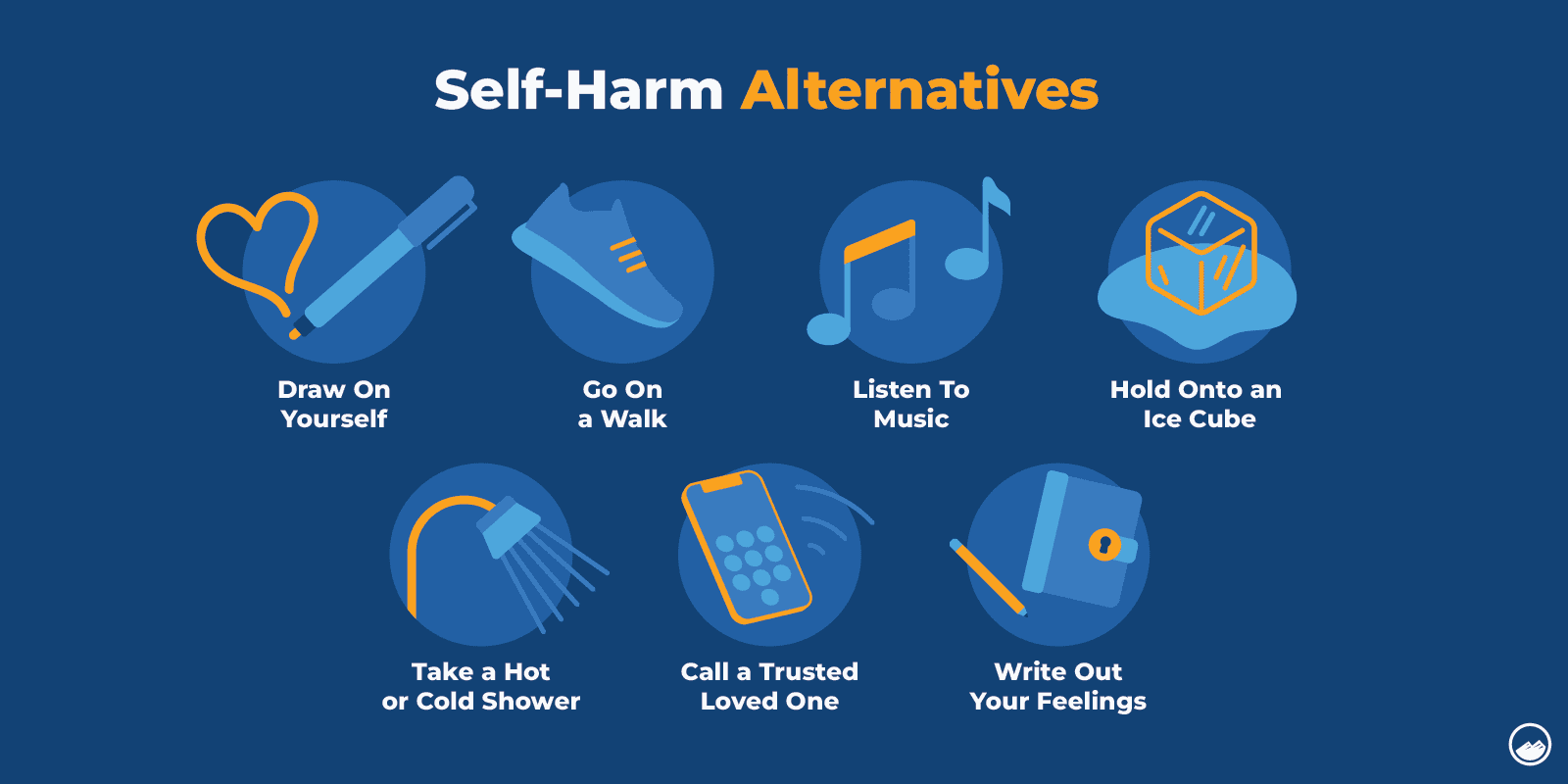
Treatment for Self-Harming
How Is Self-Harm Treated?
Treatment for self-harm involves treating the underlying problem. Often, self-harm is linked to an underlying mental health condition, which treatment should focus on.
Self-harm treatment focuses on helping individuals work through their challenges, mentally and emotionally, and build healthy coping mechanisms.
Psychotherapies like cognitive behavioral therapy (CBT), dialectical behavior therapy (DBT), or mindfulness-based healthcare can help individuals identify unhealthy patterns, learn how to regulate emotions, manage stress, and live in the present moment.
If injuries from self-harm are severe, sometimes inpatient care is needed to help individuals recover in a safe environment and figure out what the best next steps are to take.
How Can I Stop Self-Harming?
Self-harming can be difficult to stop, and you can feel like you have lost control over self-harming behaviors.
The first step to stop self-harming is reaching out for help. Getting professional help and addressing what is really going on inside can help adolescents, young people, and adults find relief and alternative coping mechanisms to self-harm.
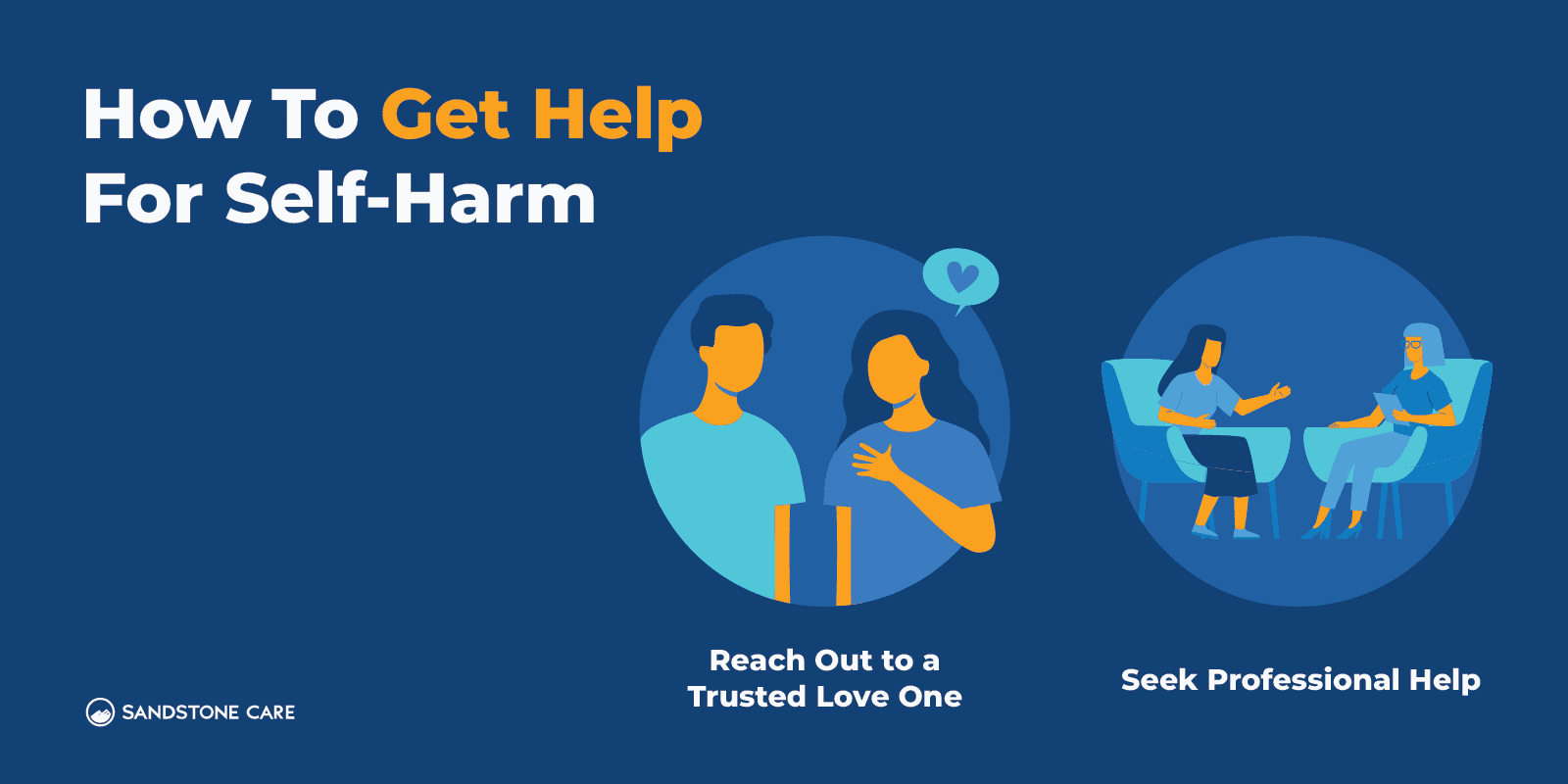
How Do You Tell Your Parents You Self Harm?
Having a conversation with your parents about self-harm can feel scary and overwhelming at first.
Preparing yourself and what you want to say before you start the conversation can help give a clear message and share with them everything you are comfortable with. Be open and honest with them, and give them time to process what you are saying.
Asking for help can be challenging but integral for your life, health, and healing.
What Does Relapse Mean in Self-Harm?
A relapse is when someone returns to a behavior or habit that they haven’t engaged with for some time.
How Do You Heal Self Harm Cuts?
If you are injured or wounded, it is important to get care right away. In severe and emergency cases, call 911. If you are caring for self-harm cuts at home, you should make sure to clean them and cover them with sterile dressings to prevent infection.
FAQ
You Have Questions, We Have Answers.
Our goal is to provide the most helpful information. Please reach out to us if you have any additional questions. We are here to help in any way we can.
Yes, self-harm means that a person hurts themselves on purpose. These actions can cause extreme pain, not only physically but mentally as well.
Some people with OCD experience thoughts or urges to harm others or themselves. Sometimes referred to as self-harm OCD, a person with this subtype of OCD can experience distress and fear that these thoughts may come true.
More shows and movies are talking about self-harm and spreading more awareness.
In Ginny and Georgia, season 2, episode 6, Georgia finds out Ginny self-harms.
The behaviors associated with eating disorders can be considered a form of self-harm.
However, usually with eating disorders, the intention is not to directly harm oneself but to achieve a certain goal, whether it is control, weight loss, or a certain body image. But, in order to achieve this goal, a person harms themselves.
Tattooing is not a form of self-harm. Tattoos are most often used as an act of creativity. However, it is possible that a person intentionally gets a tattoo as a way to induce pain.
It is not surprising that in addition to depression, anxiety, BPD, PTSD and eating disorders, substance addiction is also common for those that engage in self-harm. Some may start with self-harm and then move to substance abuse or vice versa. Drugs or alcohol may be used to mask the sense of guilt around self-harming, they may be used as an additional poor coping mechanism to escape from emotions, or they may be used as their own form of Self-harm.
Substance use in coordination with self-harm can quickly escalate and become very dangerous as substances tend to numb feelings of pain, and decrease sound judgement and fine motor skills. The results can be severe. For those suffering from a substance abuse issue and engaging in self-harm, an addiction treatment center that can offer rehab and counseling is necessary.
The mental illnesses that coincide with self-harm and addiction need to be treated as well. If counseling and therapy for the fundamental disorders is not received, the destructive coping mechanisms will most likely return.


